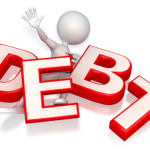2 Minutes Read
I am the author of this blog and also a top-producing Loan Officer and CEO of InstaMortgage Inc, the fastest-growing mortgage company in America. All the advice is based on my experience of helping thousands of homebuyers and homeowners. We are a mortgage company and will help you with all your mortgage needs. Unlike lead generation websites, we do not sell your information to multiple lenders or third-party companies.
Where does my Earnest Money go? A basic and very obvious question that most First-Time home Buyers ask once their purchase contract gets accepted.
Earnest Money – an earnest payment (sometimes called earnest money or simply earnest, or alternatively a good-faith deposit) is a deposit towards the purchase of real estate or publicly tendered government contract made by a buyer or registered contractor to demonstrate that he/she is serious (earnest) about wanting to complete the purchase.
When a buyer makes an offer to buy residential real estate, he/she generally signs a contract and pays a sum acceptable to the seller by way of earnest money. The amount varies enormously, depending upon local custom and the state of the local market at the time of contract negotiations.
An Earnest Money Deposit (EMD) is simply held by a third-party escrow company according to the terms of the executed purchase contract. For example, there may be a contingency period for appraisal, loan approval, property inspection or approval of HOA documents. In most cases, the Earnest Money held by the escrow company is credited towards the home buyer’s down payment and/or closing costs.
*It’s important to keep in mind that the EMD may actually be cashed at the time escrow is opened, so make sure your funds are from the proper sources.
The Process:
- Earnest Money is submitted to an escrow company with the accepted purchase contract
- At the close of escrow, the EMD is credited towards the down payment and / or closing costs
- If there are no closing costs or down payment, the EMD is refunded back to the buyer
Who Doesn’t Get Your Earnest Money:
- Selling Real Estate Agent – A conflict of interest
- Sellers – Too risky
- Buying Agent – They shouldn’t have your money in their account
You May Also Like:
- 73
- 69
 Since there are many reasons a homeowner may choose to refinance, we'll take a look at the four most common. 1. Mortgage Rates Drop: Typically, the most common reason that homeowners refinance their mortgage is to secure a lower interest rate. Interest rate and loan amount determines the total cost…
Since there are many reasons a homeowner may choose to refinance, we'll take a look at the four most common. 1. Mortgage Rates Drop: Typically, the most common reason that homeowners refinance their mortgage is to secure a lower interest rate. Interest rate and loan amount determines the total cost… - 68
 Mortgage Insurance, sometimes referred to as Private Mortgage Insurance, is required by lenders on conventional home loans if the borrower is financing more than 80% Loan-To-Value for his home. Private Mortgage Insurance (PMI) is insurance payable to a lender or trustee for a pool of securities that may be required…
Mortgage Insurance, sometimes referred to as Private Mortgage Insurance, is required by lenders on conventional home loans if the borrower is financing more than 80% Loan-To-Value for his home. Private Mortgage Insurance (PMI) is insurance payable to a lender or trustee for a pool of securities that may be required…






